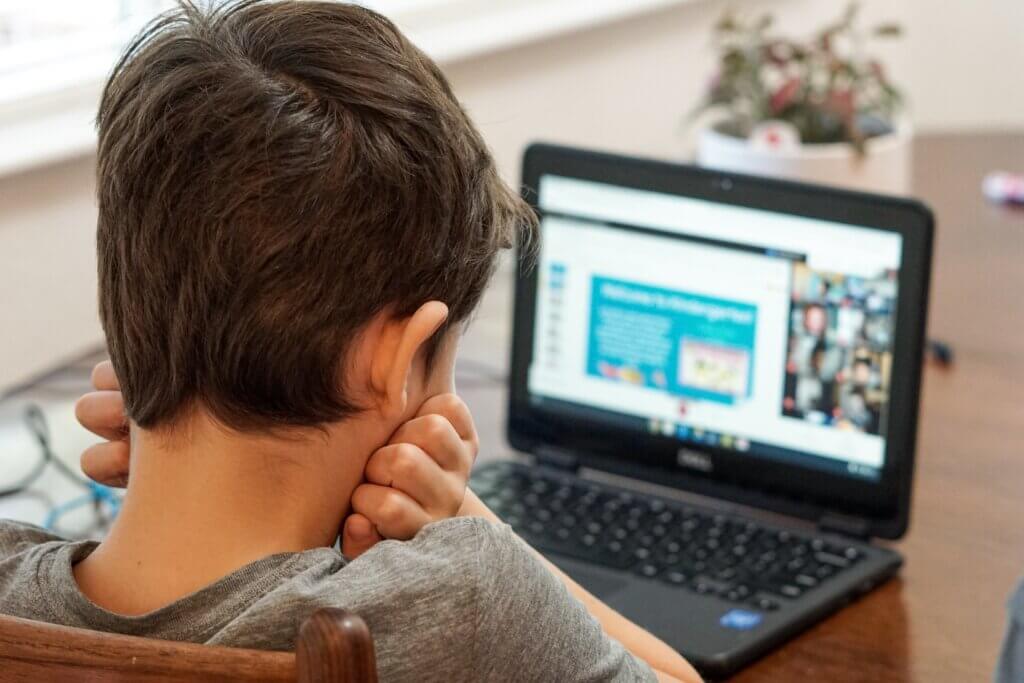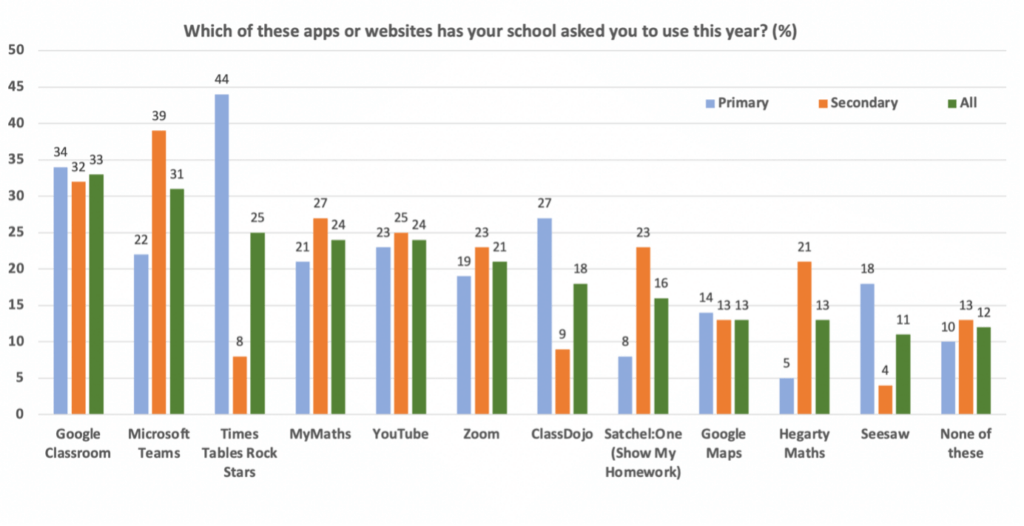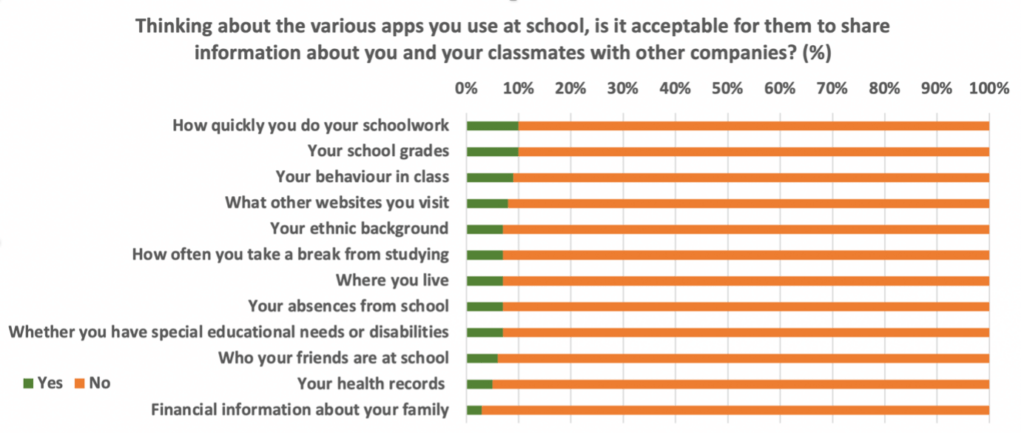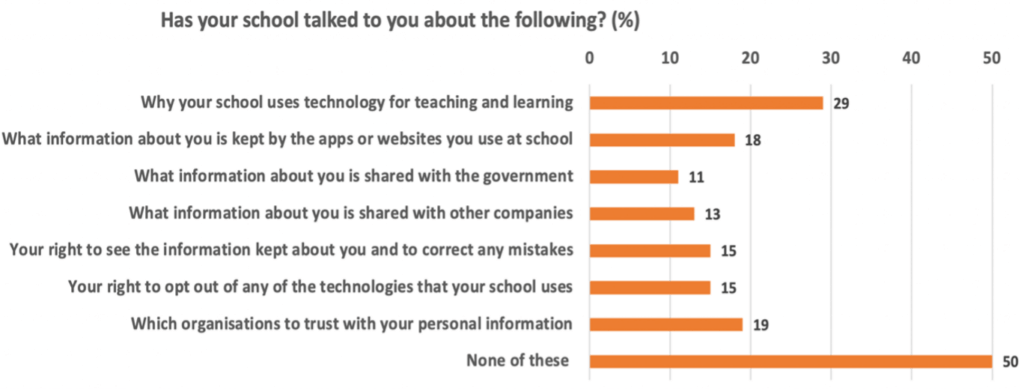By Sonia Livingstone and Kruakae Pothong
What do UK children think of the EdTech products they use at school? Have they been informed about the personal data these products collect from them? The answer to the first question is mixed, at best. The answer to the second question is, by and large, no! Yet, our recent report uncovered how digital classrooms are failing to comply with data protection regulations and leaving school children vulnerable to commercial exploitation as a consequence.
To underpin our socio-legal analysis of two digital products – one platform (Google Classroom), one app (ClassDojo) – we conducted a short nationally representative survey of 1,014 school children aged 7-16 years old. We already knew that, in 2021 alone, Google Classroom was downloaded almost 1.34 million times in the UK, and ClassDojo was downloaded 849,000 times, making them among the most used educational apps. Such use was encouraged by government-funded support during the pandemic and has continued since.
But it turned out to be hard to discover how many children are actually using these and other EdTech products. So, the Digital Futures Commission’s EdTech survey set out to answer this question and to consult children on their views.
Because we are committed to consulting children on matters that affect them, we also asked the children what they think of these products – do they think they help their learning and, if so, how? And what do they think about the data that is shared about them with companies, as part of the wider data ecosystem. Last, we wanted to know whether and how their school has explained this to them, perhaps as part of data literacy or computer science or, more simply, when requiring children to sign up for this or that EdTech app.
The results raise concerns about the governance and management of EdTech in our schools, especially viewed through a children’s rights lens, as well as about data literacy education.

Which EdTech products do children use and what do they think of them?
Almost all children (nearly 9 in 10) used at least one of the 11 EdTech products we asked them about. Over half (56%) used one or both of the two big platforms – Google Classroom or Microsoft Teams. Beyond these, as the graph below shows, Times Tables Rock Stars is popular in primary schools, as is ClassDojo and Seesaw. Show My Homework (Satchel:One) is used in secondary schools, along with maths apps. Some apps are used in both primary and secondary schools, including Google products YouTube and Maps.

Our recent report on the perspective of schools shows that these apps can bring benefits but they are also challenging to use, sometimes disappointing, and sometimes with hidden costs for teachers’ workload and pedagogy. Experts confirm this ambivalent picture of the role of EdTech.
Children, too, have mixed views about the EdTech products they use in school. The benefits that children told us about mainly revolve around helping children keep up with their learning activities and engaging them in a fun way while they are learning a particular subject.
“All my lessons and homework are on [Google Classroom], I get everything in one place, so it is easy to find.” (Girl, 15)
“In geography, we use street view [in Google Maps] to look at places around the world like the great wall of China.” (Boy, 11)
Yet, some doubt the benefits of the EdTech they use in schools, for they either find little meaning in the kind of help they get from the EdTech they use or still prefer learning in person.
“Seesaw helps because I know what I’ve done. It doesn’t help because there is really no point.” (Girl, 10)
“I don’t like to use MyMaths because I like being taught by a teacher face to face and do not like homework.” (Boy, 16)
Children perceive some of these EdTech products as behavioural management tools more than learning tools.
“ClassDojo doesn’t help [with] learning, but it encourages you to [behave] better by giving points.” (Boy, 10)
What do children think of how their data is shared with companies?
Our research has found that education data are widely shared with commercial companies, but it has proved near impossible to discover which data are shared with whom for which purpose. Our survey results found that children generally think such sharing is unacceptable. They were especially concerned about sharing more private information such as health or financial data. Overall, 69% of 6–17-year-olds said that none of these types of data should be shared with companies.

The majority of children had been taught little or nothing about their data rights. Under one third of children said their school had discussed uses of technology with them, and even fewer had been told about how their data are used. Half of them have not been told how their information is stored, used or shared at school.

By comparison, 59% say their school has talked to them about not giving out personal information, and 67% have been advised not to talk to strangers and about cyberbullying. It seems that schools focus on personal safety over privacy, and when they address data protection they tend to view it through the lens of safeguarding. The unfortunate consequence is a blind spot regarding data risks, children’s rights and commercial exploitation of data collected from children in and through schools.
What should change?
We invite schools to recognise the range of child rights issues that arise in using EdTech at scale, and encourage them to conduct meaningful conversations about their EdTech and data processing decisions with their students. This will support both children’s data rights and their data literacy. This may require new curriculum resources.
We also emphasise that schools endeavour to choose EdTech solutions that are effective, rights-respecting and safe. However, schools’ choices and the quality of these choices depend on EdTech providers acting in children’s best interests when processing data from children. This may require more effective governance.
Read more about our work on education data here.